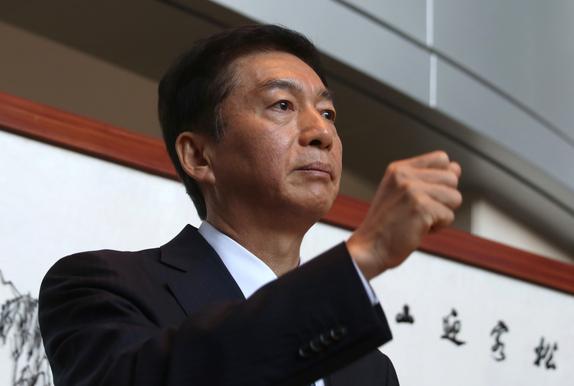 Director of the central government's Liaison Office in the HKSAR Luo Huining meets the press in Hong Kong on Jan 6, 2020. (PARKER ZHENG/CHINA DAILY)
Director of the central government's Liaison Office in the HKSAR Luo Huining meets the press in Hong Kong on Jan 6, 2020. (PARKER ZHENG/CHINA DAILY)
HONG KONG - Safeguarding the national security is the constitutional responsibility that the Hong Kong Special Administrative Region (HKSAR) must fulfill in accordance with the HKSAR Basic Law, Director of the Liaison Office of the Central People's Government in the HKSAR Luo Huining said Saturday.
READ MORE: National security legislation is SAR's duty, Lam says
In an article for the 30th anniversary of the promulgation of the Basic Law, Luo highlighted the legislative purpose of the Basic Law as "upholding the national unity and territorial integrity, and maintaining the prosperity and stability of Hong Kong," which is written into the preamble of the Basic Law.
Safeguarding the national sovereignty, security and development interests and maintaining Hong Kong's long-term prosperity and stability are interdependent, and the two cannot exist separately
Luo Huining, director, the central government's Liaison Office in the HKSAR
Safeguarding the national security is also the core requirement for the comprehensive and accurate implementation of the "one country, two systems" principle, Luo said.
"Safeguarding the national sovereignty, security and development interests and maintaining Hong Kong's long-term prosperity and stability are interdependent, and the two cannot exist separately," Luo said.
Hong Kong's long-term peace and stability can only be guaranteed by establishing and improving the legal system and enforcement mechanism on safeguarding the national security, strengthening law enforcement, preventing and containing external forces from interfering in Hong Kong affairs and carrying out separatist, subversive, infiltrating and sabotage activities in the SAR region, Luo said.
The bottom line of the "one country, two systems" principle was seriously challenged and the authority of the Constitution and the Basic Law faced unprecedented threats during Hong Kong's social unrest last year, Luo said.
The deep-seated social problems emerging in Hong Kong must be resolved and the time has come, Luo said.
The bottom line of the "one country, two systems" principle was seriously challenged and the authority of the Constitution and the Basic Law faced unprecedented threats during HK's social unrest last year, Luo said
Luo pledged to follow the direction of Xi Jinping, general secretary of the Communist Party of China Central Committee, to unswervingly implement the "one country, two systems" principle to make sure that it is fully applied in Hong Kong without being bent or distorted, and keep it advancing in the right direction.
More efforts will be made to improve the systems and mechanisms for the implementation of the Constitution and the Basic Law, including the central authorities exercising overall jurisdiction over Hong Kong, Luo said, adding that the constitutional order established by the Constitution and the Basic Law will be further protected.
Luo vowed to enhance education on the Constitution and the Basic Law, the national conditions, the Chinese history and culture in Hong Kong, especially for government personnel and young people, to raise national awareness and patriotism among Hong Kong compatriots.
Luo vowed to enhance education on the Constitution and the Basic Law, the national conditions, the Chinese history and culture in Hong Kong, especially for government personnel and young people, to raise national awareness and patriotism among Hong Kong compatriots
Since Hong Kong's return to China, the central authorities have effectively exercised overall jurisdiction over Hong Kong in accordance with the Constitution and the Basic Law, appointing five Chief Executives and other principal officials of the HKSAR government, receiving reports on the appointment and removal of judges of the Court of Final Appeal and the Chief Judge of the High Court, managing the diplomatic and defense affairs regarding to the HKSAR, and exercising the power of interpretation of the Basic Law, he said.
In particular, the National People's Congress Standing Committee adopted an interpretation of Article 104 of the Basic Law in 2016, effectively containing the "Hong Kong independence" forces.
The HKSAR judiciary independently exercised judicial authority according to law, and make judgments on cases involving "Hong Kong independence" activists running in elections and taking oath according to the Basic Law and related interpretations. The HKSAR government banned the Hong Kong National Party advocating "Hong Kong independence" according to the Societies Ordinance.
Luo said the moves above positively safeguarded the authority of the Basic Law and the rule of law in Hong Kong.
Under the Constitution and the Basic Law, Hong Kong has enjoyed a high degree of autonomy, Luo said, citing fully protected rights and freedoms of residents, steady democratic advance, and stable economic growth, as well as progress in many other areas including education, health care and social security.
ALSO READ: Moving Hong Kong forward: Basic imperatives to restore equilibrium
Hong Kong also remains competitive in foreign direct investment and business environment and has global-leading rankings in the rule of law and freedom, Luo said.
The successful implementation of "one country, two systems" since the promulgation of the Basic Law 30 years ago shows that, implementing the principle of "one country, two systems" and the Basic Law in a comprehensive and accurate manner is the only way to ensure the smooth and long-term successful practice of "one country, two systems", he noted.
Luo said he believes the HKSAR government and various sectors of the society, with the support from the central government, will make concerted efforts to overcome challenges ahead and create a better future for Hong Kong.


